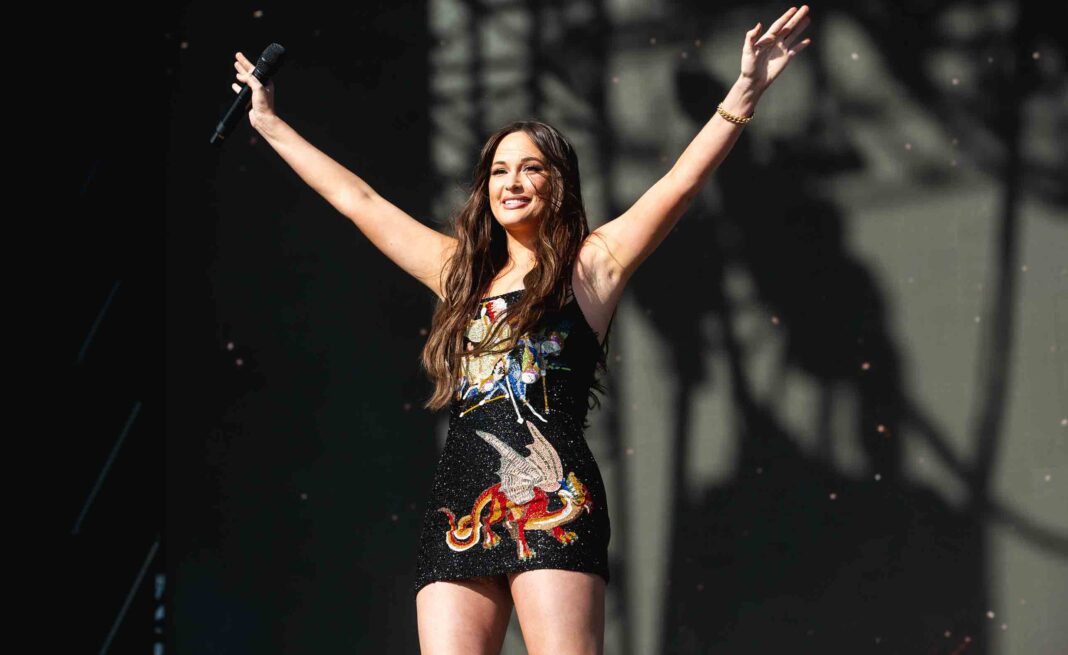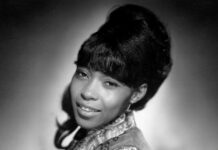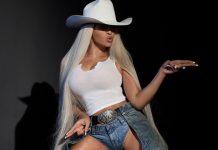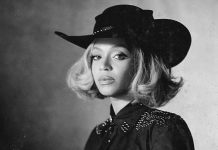As an artist, activist and woman with a deeply-enviable eye for interior design, Kacey Musgraves is the kind of contemporary country popstar that fans can believe in.
Not content with this roster of talent though, she has teamed up with her friend Reese Witherspoon to bring others along for the ride, feeding into her ongoing advocacy for a more inclusive, welcoming genre. Their method for doing so? My Kind Of Country, a new Apple Music talent show which rejects the typical ‘American Idol’ audition format in favour of a road trip across the world, seeking out new talent and inviting them to Nashville to perform for a sympathetic panel of country musicians; Jimmie Allen, Orville Peck and Mickey Guyton.
The commissioning of this show like this feels like a timely move. Taylor Swift, Miley Cyrus and Lil Nas X are just some of the artists who have demonstrated country’s crossover potential, while Kacey herself has become something of a cult stan icon, performing to heaving crowds at Glastonbury and Coachella. We can look to the stature of the Highwomen – made up of Amanda Shires, Maren Morris, Brandi Carlisle and Natalie Hemby – as examples of women who regularly challenge sexism and misogyny in their music.
While artists like these feel like a promising new frontier for country representation, the genre does still however have a lot of issues to work through in terms of even respect and representation. Badass, outspoken women have always been present in the genre – alongside the likes of Dolly Parton, Loretta Lynn or Shania Twain, we might even think back to 1952’s Kitty Wells, a singer-songwriter whose track ‘It Wasn’t God Who Made Honky Tonk Angels’ was written as a direct ‘diss-track’ response to Hank Thompson’s misogynistic song ‘The Wild Side of Life’. It became the first single by a solo female artist to reach No. 1 on the country charts with some utterly brilliant one-liners; “It’s a shame that all the blame is on us women.”
However, successes like this have frequently been the exception rather than the rule. Instead, country music often relies on lyrics and visuals that are rooted in conservative, heteronormative values. Even when songs appear to made a stab at displaying a wider view of femininity — like Lee Brice’s 2020 ‘One Of Them Girls’, an ode to the kind of apparently-rare women who “peels off the Bud-Light label…” — there is an air of patronisation, a sense that the men will decide what kind of boundaries they’ll allow women to push.
Another more recent example might be Megan Moroney’s ‘Tennessee Orange’, an admittedly catchy banger which went viral on TikTok in late 2022. Allegedly written as a flirtation with her now-rumoured boyfriend Morgan Wallen, it tells a pretty fun and heartwarming tale of a die-hard University of Georgia football fan who falls for a University of Tennessee supporter so hard that she’s willing to wear his colours. There’s some basic feminism in the idea of a female football fan, but when you did a little deeper, it again drives home a trope of submissiveness that is so frequent in country, with depressingly low standards: “I met somebody and he’s got blue eyes/He opens the door and he don’t make me cry.” Indeed, the way in which the song has been celebrated mostly through its relation to Wallen – a country sensation whose now-infamous use of the N-word in 2021 hasn’t stopped him from taking over this week’s Billboard chart — reveals a certain desire to market even well-performing female artists through their proximity to men’s world.
As the excellent Maren Morris put it recently in an interview, there is a place for the kind of “bro country” that genuinely does reflect some people’s lives. The problem occurs when no space is made for differing perspectives. While artists like Morgan Wallen and Chris Stapleton can almost guarantee airplay and commercial success, much less mainstream attention has been directed to the lyrically-nuanced likes of Amanda Shires (whose album ‘Take It Like A Man’ was a highlight of 2022), Amythyst Kiah, Allison Russell, Paisley Fields, Yola or even Trixie Mattel, made famous for appearing on Ru Paul’s Drag Race but who also performs as a pretty killer country singer. According to an article from NBC News in 2020, several studies showed a 66% decline in women’s country radio airplay from 2000 to 2018 and a 9.7 to 1 ratio in total play for men versus women, with further studies revealing a tendency to sideline or ignore much-needed intersectional conversations about race and LGBTQ+ representation.
Though female artists like Kacey Musgraves, Maren Morris and Mickey Guyton have vocalised their anger with these issues, a show like My Kind Of Country is a great way to subtly demonstrate what those radio stations are missing out on by only platforming straight white men. It’s a show that seems set to lead by example: as panellists, Jimmie Allen, Orville Peck and Mickey Guyton are excellent examples of artists who are pushing country forward in spite of notable ‘difference’ or marginalisation. As recently as 2022, Guyton was the first Black woman to ever win a Grammy in a country category, while Peck has been outspoken about what it means for him to perform as a gay man, adopting his signature mask as a kind of safety shield. Both have had to deal with horrific online abuse and erasure, the kind which surely has a knock-on effect on the next generation of aspiring artists.
Meanwhile, Jimmie Allen discusses in the show trailer that it took him 11 years to secure a record deal, and has spoken in the past about the obstacles he has faced in his attempt to be taken seriously within the genre. “I’m not naive to the fact that there are people across the world that don’t like other people because of [their] skin colour. I get it. But why would I wanna focus on that? You know how we change hearts? By treating people well and making good music.”
In this spirit of positivity, the panel team of My Kind Of Country seems set to thrive under the leadership of Musgraves, who has long proven herself to be a great ally to all kinds of people. Witty and sassy when she needs to be, she is somebody who has at times been ostracised from the community herself, but is clearly capable of putting her cowboy-booted heel down in the name of social progress. If country really is, as the old adage goes, ‘three chords and the truth’, there is absolutely no reason why that truth can’t stretch across worldwide regions, across languages and diasporas. By moving the conversation away from simply attracting more women or more queer folk into something much more intersectional, My Kind Of Country exists in a potentially powerful position, demonstrating that country is so much more than the domain of white middle-America.
Maybe Kacey’s fellow cowgirl Reese Witherspoon says it best in the trailer: “country music should stop limiting people, and start opening doors.” Country music has come on leaps and bounds in the last decade, but the more stories that it is able to showcase, the sooner it will be able to shed the shackles of its narrow-minded reputation.
READ MORE: The country musicians getting stick from the genre’s trad fanbase – and coming out on top






